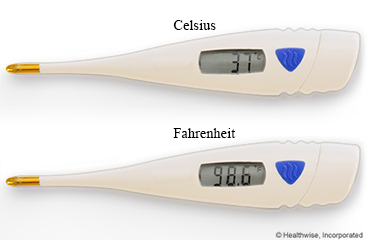Fever in Children 3 Months to 3 Years: Care Instructions
Your Care Instructions

A fever is a high body temperature.
Fever is the body's normal reaction to infection and other illnesses, both minor and serious. Fevers help the
body fight infection. In most cases, fever means your child has a minor illness. Often you must look at your
child's other symptoms to determine how serious the illness is.
Children with a fever often have an infection caused by a virus, such as a cold or the flu. Infections caused
by bacteria, such as strep throat or an ear infection, also can cause a fever.
Follow-up care is a key part of your child's treatment and safety. Be sure to make and go to all
appointments, and call your doctor if your child is having problems. It's also a good idea to know your
child's test results and keep a list of the medicines your child takes.
How can you care for your child at home?
-
Don't use temperature alone to judge how sick your child is. Instead, look at how your child acts. Care at
home is often all that is needed if your child is:
-
Comfortable and alert.
-
Eating well.
-
Drinking enough fluid.
-
Urinating as usual.
-
Starting to feel better.
-
Dress your child in light clothes or pajamas. Don't wrap your child in blankets.
-
Give acetaminophen (Tylenol) to a child who has a fever and is uncomfortable. Children older than 6 months
can have either acetaminophen or ibuprofen (Advil, Motrin). Do not use ibuprofen if your child is less than
6 months old unless the doctor gave you instructions to use it. Be safe with medicines. For children 6
months and older, read and follow all instructions on the label.
-
Do not give aspirin to anyone younger than 20. It has been linked to Reye syndrome, a serious illness.
-
Be careful when giving your child over-the-counter cold or flu medicines and Tylenol at the same time.
Many of these medicines have acetaminophen, which is Tylenol. Read the labels to make sure that you are not
giving your child more than the recommended dose. Too much acetaminophen (Tylenol) can be harmful.
When should you call for help?
 Call 911
anytime you think your child may need emergency care. For example, call if:
Call 911
anytime you think your child may need emergency care. For example, call if:
Call your doctor now or seek immediate medical care if:
Watch closely for changes in your child's health, and be sure to contact your doctor if:
Current as of: August 6, 2023
Content Version: 14.0
Care instructions adapted under license by your
healthcare professional. If you have questions about a medical condition or this instruction, always ask
your healthcare professional. Healthwise, Incorporated disclaims any warranty or liability for your use of
this information.